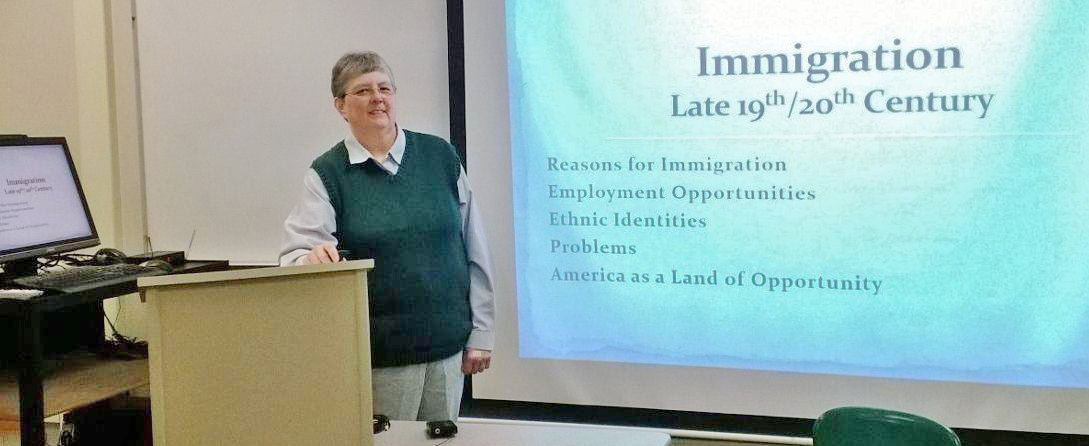This summer, APSCUF is going behind the scenes to show how faculty members and coaches continue to devote themselves to affordable, quality education even when class is not in session.

Karen Guenther produces lecture videos of her history classes at Mansfield University.
I began my career at Mansfield University as a tenure-track assistant professor of history in August 1998 after several years working in the private sector as a corporate trainer and supervisor and as an adjunct at several colleges. I quickly realized that being a college professor indeed meant more than teaching four classes a semester and holding office hours. At a small public liberal arts university such as Mansfield, it is very easy to become overwhelmed with the opportunities available for service, particularly membership on Senate committees, department committees, and the local chapter of APSCUF. Knowing that in order to be promoted from assistant professor to associate professor and now full professor I had to meet (and later, exceed) standards for promotion meant that while I was busy preparing new courses and grading student work, I also was expected to be an active scholar and serve the department, university, and community.
A lot has changed since Fall 1998. For example, I performed content visits of social studies student teachers my first semester (the secondary teaching certificate I earned as an undergraduate proved to be a valuable credential) to ensure that they taught accurate information; now I supervise student teachers and have prepared the accreditation reports for the social studies education program. Back then, technology in the classroom consisted of a VCR (if I was lucky) and an overhead projector; now I film my classes and produce lecture videos to help students prepare for exams and other assignments and to make my online courses as identical to a traditional face-to-face course as possible. My syllabi were just a couple of pages long, listing the required books, due dates, and assignments. Now they are monstrosities that not only include information related to how students can succeed in the course but also include Title IX information, U.S. copyright restrictions, and the dreaded student learning outcomes. I merely expected to teach my classes, spend time doing research, and join a few committees. Obviously, that didn’t work out too well.
Every semester, I am required to complete a faculty workload form. I estimate how many hours per week I will be involved in teaching, research, and service — but it’s only an estimate. If I actually punched a time clock like I did at previous jobs, it would be around 60–70 hours per week between teaching, office hours, grading, course preparation, film production, committee work, and research (and I’m sure I’m forgetting something). But I know as a professor that I don’t punch a time clock, although sometimes the temptation to punch something does occur.
Next fall, I will be required to be on campus five days a week, teaching four courses (with four different preparations) while also working a quarter of the time as academic programs assessment coordinator. One of the classes will include a group of students completing the degree requirement as individualized instructions prior to student teaching. I will be chair of the academic planning committee, the local Senate committee that reviews program changes for academic programs, and as such will be a member of the Senate executive committee and be expected to attend University Senate meetings. I also will chair the university sabbatical committee in the fall, along with leading the general education assessment team (one of my assessment duties). My schedule will require me to be on campus from 8:30 a.m. to at least 5 p.m., possibly later, many days because of class and meetings — and sometimes I eat lunch during meetings (skipping meals is not an option for medical reasons). In my spare time (!), I will continue to work on a research project that literally has been taking up a corner of my living room for the past five years, along with being Business Secretary of the Pennsylvania Historical Association.
I do think of myself as extremely lucky, because I get to do what I love (teach and research) and get paid to do it. I’m doing what I wanted to do 30+ years ago — teach at a small public university that values teaching — while at the same time having fun while working on assorted research projects. Faculty members like me are not just teaching content, but we are teaching our students valuable skills that will help them succeed in the changing world.
Karen Guenther is a professor of history at Mansfield University of Pennsylvania.
